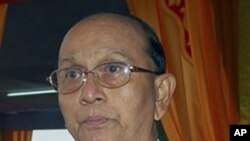Burma’s military-dominated parliament has elected the country’s first president, choosing military loyalist Thein Sein. Although a civilian now is nominally leading the government, Burma experts say the military maintains its grip on power but there is still a chance for gradual change.
Burma’s parliament on Friday elected a former general, Prime Minister Thein Sein, to serve as the country’s president in the new civilian government.
He was chosen over two other military loyalists who will serve as vice presidents.
As prime minister, he was the international face of Burma’s military government and considered the favorite for president.
He resigned from the military to lead the Union Solidarity and Development Party to victory in a controversial November election.
The government says the vote was key to a move to civilian-led democracy.
The USDP, backed by the military, won about 80 percent of the elected seats. Rights groups call the vote a sham and opposition parties complained of vote fraud and intimidation.
Carl Thayer is a professor specializing in Southeast Asia at the Australian Defense Force Academy. He says despite the new civilian leadership, the military remains the dominant force in Burma, also known as Myanmar, but he holds out hope for change.
"If we take the Indonesian example, once you create different interests among civilianized military from the professional military itself, and as Burma opens up, then what we saw in new order Indonesia was a rift between military and the Suharto regime and its cronies. That could also happen in Myanmar," he said.
Burma’s parliament convened this week for the first time in two decades to choose the president, who will then appoint a government.
It is not clear if Senior General Than Shwe will remain head of the military, but Thayer says he is likely to maintain some power at least for the time being.
"To play a role behind the scenes, trying to protect his empire, his family interest, and manipulating. But, at 77 he will go the way of other dictators, that, eventually people will be looking beyond him because of mortality. And thus the loyal subalterns and lieutenants begin to make their own arrangements," he said.
The military closed parliamentary procedures to the public and announced strict rules for raising questions that prevent debate over issues it does not want discussed.
The military-drafted constitution reserves a quarter of all seats in parliament for the army, even before elections.
The largest opposition group won only 12 seats.
The National League for Democracy, the biggest opposition party, was disbanded for boycotting the election and refusing to expel leader Aung San Suu Kyi.
The NLD won Burma’s last election in 1990 but the military never allowed it to take power and kept Aung San Suu Kyi locked up for most of the past two decades.
She was freed from house arrest after the elections but is not allowed to participate in politics.




